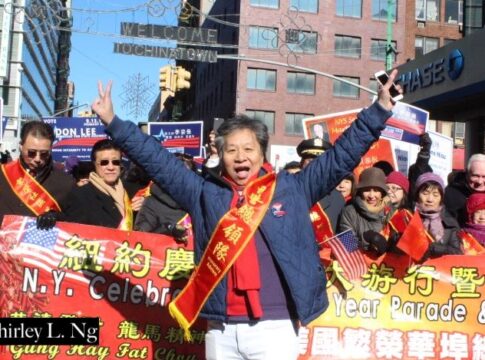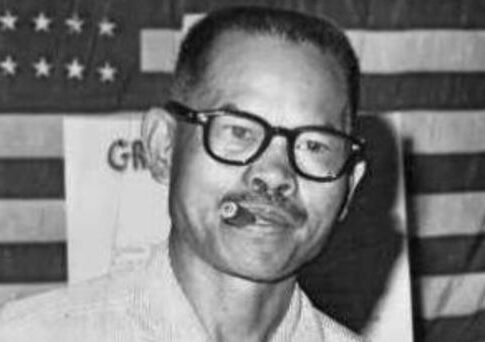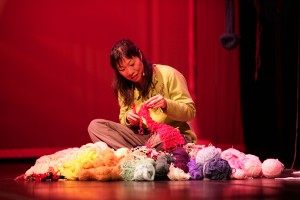 (Note from the Editor: Wong Flew Over the Cuckoo’s Nest premiered in 2006 and since then, Kristina Wong has performed her one woman show at 40 different engagements. Motivated by her desire to bring to light an uncomfortable topic most would prefer not to talk about, Wong uses the unlikely genre of comedy to explore the high rate of suicide among Asian American women. Her performance which I guarantee will make you laugh and think is now available on DVD for the fist time from the the Cinema Libre Store. Wong agreed to answer the following questions from AsAmNews.)
(Note from the Editor: Wong Flew Over the Cuckoo’s Nest premiered in 2006 and since then, Kristina Wong has performed her one woman show at 40 different engagements. Motivated by her desire to bring to light an uncomfortable topic most would prefer not to talk about, Wong uses the unlikely genre of comedy to explore the high rate of suicide among Asian American women. Her performance which I guarantee will make you laugh and think is now available on DVD for the fist time from the the Cinema Libre Store. Wong agreed to answer the following questions from AsAmNews.)
What motivated you to tackle such a depressing topic?
This show was a lifetime in the making. When I was 13, I asked my mother if
I could see a therapist, thinking that it was be a magical fix-all for my
teenage angst. My mother told me that therapy was expensive and if anybody
found out saw a therapist (even at 13) that I wouldn’t get a job when I was
older. This sort of misunderstanding of therapy is not uncommon in Asian
families but sent me a clear message: “Suffer in silence. Save money. Get a
good job.”
In 2004, Iris Chang, the Chinese American historian who wrote
“The Rape of Nanking” committed suicide. I remembered her speaking at my
college and it was obvious that she worked extremely hard, but also, that
her work was taking a huge mental toll on her. I read a long op-ed article
in the SF Chronicle about her life and death and I felt like I could
identify with this hard working perfectionist who refused to take breaks and
rarely admitted weakness.
In 2005, I came across an article that reported
that Asian American women had the second highest rates of suicide. It was a
statistic that was both familiar and surprising. And with that, I embarked
on creating a show about a subject nobody was talking enough about.
LATEST STORIES
Why did you choose to handle such a serious matter in a comedic way?
I naively thought that in researching this show that I would be doing
scholarly things like reading books and interviewing other people. What I
didn’t want but what ended up happening was I had to do a tremendous amount
of painful self-inquiry. The first shows I did were NOT funny and were
miserable for me to perform. My rehearsals were like emotional exorcisms.
I’d spend days in bed fearing the show. I would knit until my hands got
sore to avoid working on it. I felt guilty that the show wasn’t “doing
enough.” I knew I had to find humor if I was going to tour this show. The
humor really came out of the process of trying to make the creation and
performance process less painful. I started making fun of myself mostly to
amuse myself through the process. The result is that the show’s character
of “Kristina Wong” is a satire of myself– an unreliable narrator with a
fatal savior complex.
Why did you spend so much time stressing to the audience that this piece was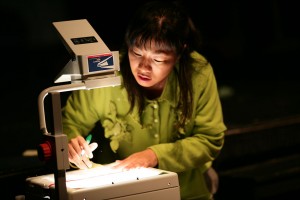
fictional, and not autobiographical?
Originally, I created sections of the show out of order. Not all the
details in the show are true to life, but it was a very scary thing to
emerge after a show and have an audience greet me with “Are you ok?” It was
really scary to let my memories, life, and mental health be consumed this
way by an audience. I created this long preface that the show was “fiction”
as a form of self-preservation. As I developed the show, I realized this
idea of “fiction” was a great metaphor for how depression and suicide
manifests in Asian American communities. Asian Americans I know, including
myself, tend to “fictionalize” that anything is going wrong in order to save
face.
What kind of pressures do you face as a performer and writer in a one women
show as opposed to working with an entire cast?
I think from the outside it may look like I live this charmed life as a
working artist who tours the world, but the reality is my lifestyle can be
extremely erratic and stressful. I am simultaneously the artist, producer
and business woman and it’s exhausting. I have months where I zigzag all
over the country performing and other stretches of time where nothing is
happening and I panic about my livelihood. Touring this show for as long as
I did made for some of the loneliest and most exhausting years of my life.
It was especially hard when I would play venues that weren’t able to afford
a director or technician to come with me and I’d be barfing out all my
emotions onstage but have nobody to lean on after. I am grateful that this
show helped me learn so much about myself, how I work as an artist, and how
to better take care of myself for the future. I’d never recommend anybody
explore this issue without a good support system.
Suicide is such a universal topic. How would the show have been different if
you had removed ethnicity from your character?
This show becomes more about the culture of silence around mental illness in
Asian American communities than me trying to “medicalize” all Asian American
women as prone to depression. My interest in framing my show as exploring
“an Asian American women’s issue” is because our rates of suicide and
depression are abnormally high. Also, because of the “model minority myth,”
many people assume that if Asian American women are going to good colleges
and getting good jobs, how could anything possibly be wrong? If my
character was white, and not a person of color, I think her attitude around
therapy would be different, I also think that the openness to talk about
depression would have a lot less stigma.
What stories do you have about the impact the play has had on individual
audience members?
Even before I premiered the show, there were people contacting me about
their experiences with depression–Asian Americans and not, and even men.
I began to feel like people were approaching me because I was easier to talk
to and more accessible than a therapist. The difference is, I’m not a
therapist. What surprised me was that there were people who you’d never
think got depressed because they seem so together– professors, student
leaders, people who have high power jobs. I could tell they felt relieved
to share their experiences with someone. We’ve also had some really teary
Q&As where audience members have shared what they have experienced and some
ask for help with issues they or their loved ones are having. I can’t say
the show “fixes” anything but it does spark dialogue about a very
stigmatized issue. It brings this issue out in the open. That’s where this
healing starts.
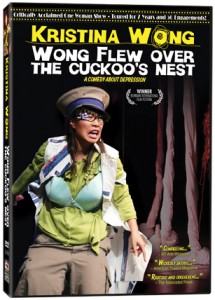
What difficulties did you face making live theater come across in a DVD?
The show is extremely interactive and in a live audience, an audience is
forced to do things that your average passive “sit in the dark” audience
does not have to deal with. You don’t get to interact with me the same way
when watching me on film, but I do think that director Mike Closson is able
to capture the spirit of what’s happening in the audience.
What’s the difference between dramatizing the pressures Asian Americans may
feel in succeeding versus stereotyping Asian Americans as hard working and
overachievers?
To reframe this question, I think it’s already a faulty task to embark on
making a show about “ALL Asian American women” because the obvious risk is
it turns a very diverse demographic into a monolith. I realized very
quickly there were too many people that fall under the categorization of
“Asian American Women” to represent honestly in a show… refugees, American
born, queer, straight, mixed race, South Asian, East Asian, working class,
middle class…. There was no way I would be able to make a show that could
explain all these experiences. So this show becomes more about the failure
of explaining why Asian American women have some of the highest rates of
depression and suicide and my character is a metaphor for the overachieving,
do-no-wrong, saving face cultural attitudes that contribute to this
statistic.
What would you like the audience to come away with after watching the DVD?
I’d love for audiences to realize that the conceit of the show “being about
Asian American women” is actually more a premise than outcome. I hope if
anything, they get that it’s the fictionalization around depression and the
silence around these issues that causes depression and suicide to spike.
Is there anything you’d like to say about the play and DVD?
I’ve been trying to retire touring the show live and move onto new projects
but the DVD has actually reinvigorated interest in the live show and so I
will be doing some performances in 2014. It’s been a blessing to get to do
this show so much, but I think it also points to a real need to address
mental health issues, especially in communities of color. I hope this film
will allow the message of the show to live on when I really, actually retire
the show one day.
You can purchase Wong Flew Over the Cuckoo’s Nest here from the Cinema Libre Store
You can watch the trailer below.
Wong Flew Over The Cuckoos Nest Trailer from Cinema Libre Studio on Vimeo.

